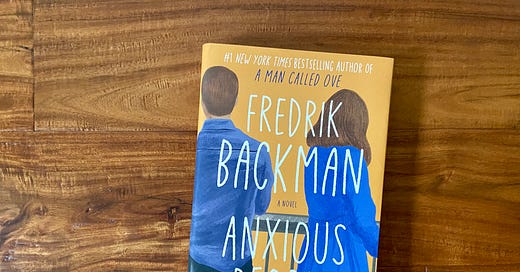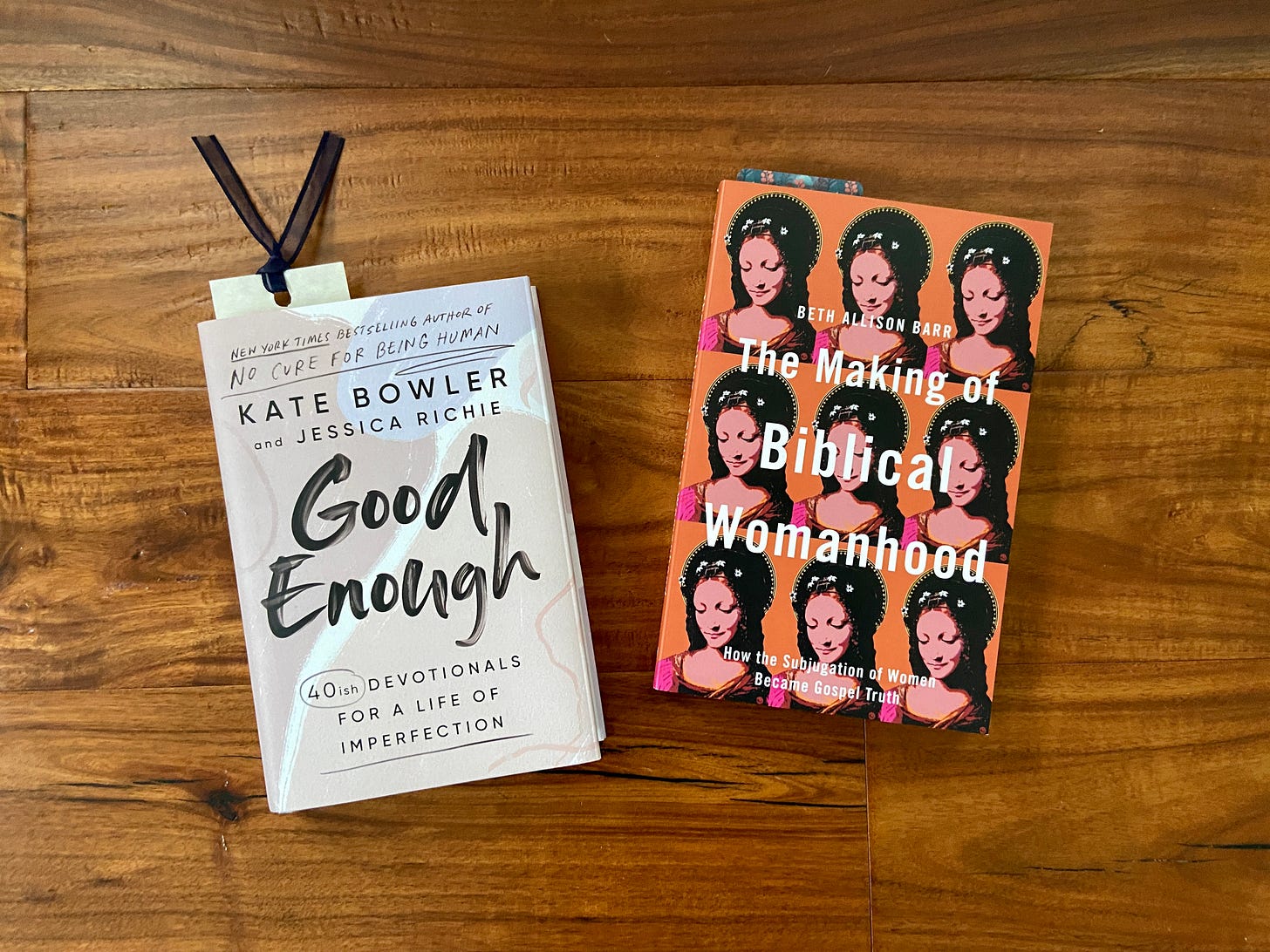Before we dive in, do you mind taking 2 minutes to fill out a quick survey? Now that this newsletter is 8 months old, I’d love to know your thoughts on how it’s going!
Hello from the last day of March! It’s spring break for us here in Wisconsin, so of course we got 3 inches of snow today. I am eager for stretches of sunshine and warmth and it’s getting hard to focus on anything as the cold, damp weather drags on — expect books. Those are season-less.
If you’re reading this for the first time thanks to my friend, Sonya Spillmann, telling you to — welcome! And be warned: I am not as funny as she is. But as Sonya promised, I do read — a lot — and write about it, so let’s get to the books…
Here’s what I read in March:
Anxious People: A Novel
by Fredrik Backman
This is a new favorite, and with good reason: I think Fredrik Backman is one of the most observant writers of today, seeing life as it really is, flaws and all, and describing them to us in a way that feels true — and makes us feel less alone in our fears, our loneliness, our anxieties. It’s on the surface a story about a bank robbery gone wrong, an accidental hostage situation, and the aftermath. But really, it’s about being human and all the complexities that come with it. I laughed, I cried — I loved it.
If you also read and loved this one, I think John Green’s The Anthropocene Reviewed makes a nice non-fiction companion. Maybe Kate Bowler’s No Cure For Being Human, too? And of course, if you haven’t read Backman’s Beartown (a story about sports that’s not about the sports!) and sequel, Us Against You, you must. The third and final is expected out in English this fall.
Effortless: Make It Easier to Do What Matters Most
by Greg McKeown
I am passionate about telling people to read McKeown’s Essentialism (a few of you are going to roll your eyes and think ugh, she’s talking about *that* book again!). I’ve read it multiple times and have found it so helpful. So I had r-e-a-l-l-y high hopes for Effortless, and I was a little disappointed. Not because it’s not good — it’s fine! — but because it felt like more of what I’ve already read elsewhere. Essentialism felt fresh and life-altering; Effortless feels like another productivity book. That said: there are some gems here, so if you don’t normally read in the productivity space, this would be an excellent summary pick that would help you skip all the others.
And you’re still going to hear me talking about Essentialism. Sorry!
Some of my favorite productivity books that are worth it: Big Dreams, Daily Joys by Elise Cripe; Deep Work & Digital Minimalism by Cal Newport; Growing Gills by Jessica Abel (affiliate link to ThriftBooks).
The Tech-Wise Family: Everyday Steps for Putting Technology in Its Proper Place
by Andy Crouch
This is the third time I’ve read this book and I find it immensely clarifying in thinking about the ways technology shapes our family — and how we invite it to. Crouch is the former editor of Christianity Today, so this book has a distinct faith element woven throughout, but I think families of all faiths (or none!) could find a lot of help here in making choices regarding technology as you raise children. The central premise: “Family helps form us into persons who have acquired wisdom and courage” (page 53). Crouch defines wisdom as knowledge that guides action, and courage as the conviction and character to act on that wisdom. Both, he argues, are undermined by an improper use of technology — and I think he’s right. There are some points I find hard to put into practice for our family as the pandemic continues and “virtual” is often the only option, but overall, I think Crouch takes a balanced approach to an issue we often paint as all good or all bad — and the book is an easy 200 pages.
The Family Firm: A Data-Driven Guide to Better Decision Making in the Early School Years
by Emily Oster
I picked up this book as I started thinking about my oldest, Arthur, heading off to kindergarten next year, not entirely sure our family was ready for that transition. I thought it might help with the decision-making, and it did — sort of. The first chapter of the book where she sets up the premise and does a walk-through of her strategy is great! She encourages you to come up with a mission statement for your family and really think hard about the non-negotiables for your family in this time period. And from there, there’s tons of “the data says this and this, and it might be correlated, but we really don’t know.” So the book ultimately fell flat for me. Worth grabbing from the library and reading the first section if you’d like to frame a Big Question for your family in the coming months, but ultimately I think most of us could pass on this one.
Oster’s bibliography in the back of the book does have recommended reading to deep-dive into some of what she talks about, and I’ll likely pick up The Art of Screen Time by Anya Kamanetz in the near future, and maybe one or two others mentioned.
Beneath Wandering Stars: A Novel
by Ashlee Cowles
My friend Ashley Brooks gifted me a copy of this 2.5 years ago when we got together for a retreat and decided to do a book swap. (We were later able to interview the author, Ashlee Cowles on our podcast, Chasing Creative!) I finally picked it up on a day that I needed an escape in a book — and it was perfect for that. This is a Young Adult (YA) novel told from the point of view of Gabi, a 17-year-old Mexican-American girl whose military family is stationed in Germany for her senior year of high school. She hates being far away from her friends in Texas and can’t wait to graduate, turn 18, and get away from the Army life. But when her brother, Lucas, who recently enlisted, gets injured on the battlefield, Gabi finds herself walking a pilgrimage along the Camino de Santiago in the hopes that it will help heal him. And she has to walk it with Lucas’s best friend, Seth — who she of course hates. It’s exactly what you want and expect in a YA novel with this premise — and I’m already looking forward to reading more from Cowles in the future.
What I’m Currently Reading:
Good Enough: 40ish Devotionals for a Life of Imperfection
by Kate Bowler & Jessica Richie
This is meeting me right where I am most days. Can recommend, heartily.
The Making of Biblical Womanhood: How the Subjugation of Women Became Gospel Truth
by Beth Allison Barr
All The Gardening Books I Checked Out At Once (oops):
Vegetables Love Flowers — Dense and one I’m planning to buy. Love the idea of creating an environment that welcomes helpful pollinators with flowers.
Edible Landscaping — If you have a big project in mind, grab from your library.
Kitchen Garden Revival —A basic step-by-step to create your own kitchen garden — also feels like an Instagram account in a book, very pretty and styled.
The Year-Round Vegetable Gardner & Growing Under Cover — Both of these are packed with good info and helpful for growing in cold climates. We’ll be purchasing both, I’m sure.
Super Easy Food Preserving — By local gardener Megan Cain; great ideas for quickly preserving what you grow. Would be better to read in summer/fall.
The Know Maintenance Perennial Garden & The Perennial Gardener’s Primer — Both are full of helpful info on planting, reviving, and maintaining a perennial garden. We’ll check them back out another year when we are ready to dive into designing more around our property, not so focused on growing food.
What I’ve been reading with the kids:
In our (ahem, my) effort to read and live more seasonably with the kids (Arthur turns 5 soon, and Tennyson had her second birthday in January), here are a few we’ve been enjoying:
Spring for Sophie — Gorgeous! So well-written! Checked out from the library, read once, and immediately ordered a copy. The book follows Sophie as she waits for spring, using her five senses to tell her when it’s finally here. Perfect for the preschool set, but I loved it, too, as a reminder to use all the senses to experience the changing of the seasons.
Little Blue Truck’s Springtime — An expansion of the classic, with lift-a-flaps and counting cute baby animals. Better for the 2yo than the 5yo.
And then it’s Spring — I teared up at a page in this one where a little boy thinks bears must have trampled his poor seeds, even though he has written a sign: “No Stomping: There are seeds here, and they are trying.” And they are trying — aren’t we all?
The Tiny Seed — A light-hearted Eric Carle book about how a seed finds a place to grow. Tennyson loved this one.
Up in the Garden, Down in the Dirt — Dense, I’d say for the older 5+ crowd, but good — part of a whole series that are all lovely.
Every Day Birds (link to ThriftBooks) — A poem about common birds in North America and what makes them special. Fun to read as we watch the bird feeder for signs of spring alongside Sophie!
The Earth Gives More — The writing in this one is okay, but the photos are gorgeous and include a wonderfully diverse cast of characters.
What spring books can you recommend? // P.S. Find all the books on this list!
What I’m Reading Next:
I just nabbed Jane Austen’s Guide to Good Manners from the library for something lighthearted and fun. I’ll report back.
We’re also deep in the weeds of potty training right now (as I write this, Day Four had no accidents! // Update: Day Five has not been so lucky), so next month look for a round up of all the potty-training books we’ve read and loved (or just books we’ve read since they were within reach while crouched on the floor of the bathroom for many, many hours).
Once again: that survey link, if you’d be so kind.
As always, hit “reply” and say hi, share your thoughts on something I’ve read, or give me ideas for what to read in the coming months. Happy reading & see you in April!











